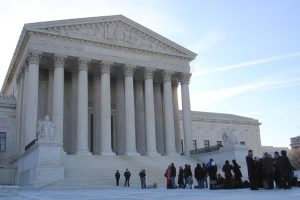Supreme Court Pauses Enforcement of TX Social Media Law
 WASHINGTON — The Supreme Court has temporarily halted the implementation of a controversial social media law passed in Texas. In the ongoing litigation of NetChoice et al v. Paxton, a split Supreme Court, 5-4, has revived an injunction that blocks Ken Paxton, the attorney general of Texas, from enforcing House Bill (HB) 20. The bill was signed into law by Gov. Greg Abbott, on September 9, 2021 as a challenge to the content moderation actions taken by online platforms like Twitter and Meta’s Facebook.
WASHINGTON — The Supreme Court has temporarily halted the implementation of a controversial social media law passed in Texas. In the ongoing litigation of NetChoice et al v. Paxton, a split Supreme Court, 5-4, has revived an injunction that blocks Ken Paxton, the attorney general of Texas, from enforcing House Bill (HB) 20. The bill was signed into law by Gov. Greg Abbott, on September 9, 2021 as a challenge to the content moderation actions taken by online platforms like Twitter and Meta’s Facebook.
The law was passed as a novel concept of state-level legislation seeking to regulate web platforms that allegedly exercise an anti-conservative biases through their algorithms. At the heart of the law, House Bill 20 prohibits platforms from censoring viewpoints that may violate a platform’s terms of service and its user protection policies and grants Texans and state officials recourse to file lawsuits against platforms that don’t enforce the so-called viewpoint neutrality promised by the law.
Florida has passed a similar law, granting a political and policy-oriented model for other Republican controlled legislatures and governorships to follow, in the name of alleviating censorship of controversial and extreme viewpoints and countering big tech’s purported bias against conservative users.
Counter to what advocates HB 20 argue, there is virtually no evidence that large technology companies systematically censor conservative viewpoints through content moderation and algorithms. A February 2021 report released by staff of the Center for Business and Human Rights at New York University’s Stern School of Business argues that evidence shows that the anti-conservative bias that tech companies supposedly have is itself “a form of disinformation” and “a falsehood with no reliable evidence to support it.”
The high court’s decision has the effect of reinstituting an injunction against enforcement of the new Texas law issued by District Court Judge Robert Pitman in December. That injunction was lifted by the U.S. Court of Appeals for the Fifth Circuit last month — a decision for which the Fifth Circuit still hasn’t published its reasoning. By a slim majority, the Supreme Court has now reinstated Pitman’s ruling, which puts enforcement of the law on hold pending the adjudication of NetChoice’s lawsuit challenging the law.
Adult industry professionals should take note of this change because this litigation will impact Section 230 of the Communications Decency Act of 1996, the law often referred to as the “First Amendment of the internet,” for the way it has enabled web platforms to self-regulate and police the use of their platforms by third parties. Porn sites, like virtually every online platform, including services like Twitter, Facebook, Google, Netflix, and Etsy, rely heavily on Section 230’s safe harbor provisions and case law upholding Section 230’s constitutionality and its protection of free expression on the internet.













